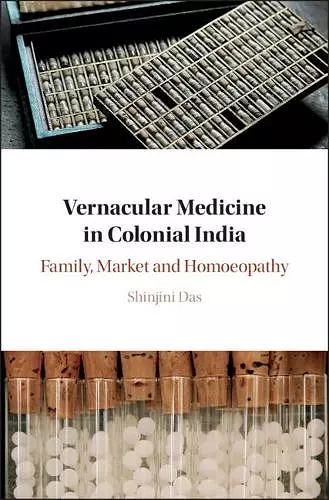Vernacular Medicine in Colonial India
Family, Market and Homoeopathy
Format:Paperback
Publisher:Cambridge University Press
Published:12th Nov '20
Currently unavailable, and unfortunately no date known when it will be back
This paperback is available in another edition too:
- Hardback£94.00(9781108420624)

Interrelated histories of colonial medicine, market and family reveal how Western homeopathy was translated and made vernacular in colonial India.
Combining insights from the history of colonial medicine and the cultural histories of family in British India, Shinjini Das examines the processes through which Western homeopathy was re-interpreted in the colony as a specific Hindu worldview, an economic vision and a disciplining regimen.Conceptualised in opposition to 'orthodox' medicine, homoeopathy, a western medical project originating in eighteenth-century Germany, was reconstituted as vernacular medicine in British Bengal. India went on to become the home of the largest population of users of homoeopathic medicine in the world. Combining insights from the history of colonial medicine and the cultural histories of family in British India, Shinjini Das examines the processes through which western homoeopathy was translated and indigenised in the colony as a specific Hindu worldview, an economic vision and a disciplining regimen. In tracing the localisation of German homoeopathy in a British Indian province, this book analyses interactions between Calcutta-based homoeopathic family firms, disparate contributors to the Bengali print market, the British colonial state and emergent nationalist governments. The history of homoeopathy in Bengal reveals myriad negotiations undertaken by the colonised peoples to reshape scientific modernity in the subcontinent.
'This remarkable book opens up radical new perspectives on the contested categories of family, empire, nation and commerce in relation to science and medicine. In a nuanced and sophisticated analysis, Shinjini Das has provided a turning point in the debate about forms of knowledge too often dismissed as 'alternative' or 'popular'. Exploring a fascinating world of medical entrepreneurs, journalists and domestic practitioners, Vernacular Medicine in Colonial India is essential reading for anyone interested in the translation of knowledge across contexts and continents.' James Secord, University of Cambridge
'In the first comprehensive account of how homoeopathy became vernacularized in India, Das skilfully investigates the reasons for its success and imaginatively examines its multiple relationships with family life, biography, print culture and commerce. This is a landmark study that insightfully combines and thereby enriches social, medical and colonial history.' David Arnold, University of Warwick
'A rich and insightful study, this book deserves to be read by scholars of medicine, the family and national identity, for it shows the importance of each to the shaping of the others.' Mark Harrison, University of Oxford
'Subtle as well as bold, this book links homoeopathy, markets, and the family in colonial India. In recounting the strange story of how German and English homoeopathy became indigenous Indian therapy, Das offers entirely fresh insights into the translations of practice, the production of a 'vernacular' in medicine and law, and the meaning of family for business. A truly fine history.' Alison Bashford, University of New South Wales
'In its cultural location in the colony, where it was believed that homeopathy was an indigenous 'Hindu' medicine, Shinjini Das' book recounts the fascinating story of the domestication and vernacular lives of this German school of medicine. Blending local histories of medical practice with the social histories of family and family-owned businesses in Calcutta, this book on the Bengali career of homeopathy is one that has been long waiting to be written.' Tapati Guha-Thakurta, Centre for Studies in Social Science, Calcutta
ISBN: 9781108430692
Dimensions: 227mm x 151mm x 18mm
Weight: 450g
308 pages